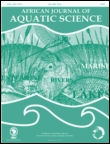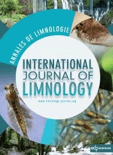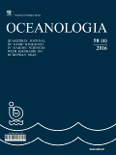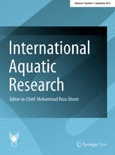
LIMNOLOGY AND OCEANOGRAPHY-METHODS
Scope & Guideline
Transforming aquatic sciences through methodological excellence.
Introduction
Aims and Scopes
- Methodological Innovation:
The journal emphasizes the development of novel methods for analyzing aquatic ecosystems, including techniques for sampling, measurement, and data analysis. - Multidisciplinary Approaches:
Research often incorporates various disciplines such as chemistry, biology, and environmental science, reflecting the complexity of aquatic systems. - Field and Laboratory Studies:
The scope includes both fieldwork and laboratory-based studies, providing a comprehensive view of aquatic research methodologies. - Focus on Environmental Monitoring:
There is a consistent focus on methods that enhance environmental monitoring capabilities, particularly in response to ecological changes and anthropogenic impacts. - Applications in Ecological Research:
The journal highlights methodologies that have direct applications in ecological research, including studies on biodiversity, ecosystem health, and biogeochemical processes.
Trending and Emerging
- Automated and Remote Sensing Technologies:
There is an increasing trend in the use of automated systems and remote sensing technologies for data collection and monitoring in aquatic environments, enhancing the efficiency and frequency of measurements. - Machine Learning and AI Applications:
The incorporation of machine learning and artificial intelligence in data analysis and interpretation is emerging as a significant theme, facilitating complex data handling and predictive modeling. - Environmental DNA (eDNA) Techniques:
Research focusing on eDNA methodologies is on the rise, reflecting the growing interest in non-invasive monitoring of biodiversity and ecosystem health. - Integrated Ecosystem Assessment Methods:
Emerging methodologies that integrate multiple approaches for comprehensive ecosystem assessments are gaining traction, emphasizing the interconnectedness of aquatic systems. - Biogeochemical Process Studies:
There is an increasing focus on innovative methods to study biogeochemical processes, particularly in response to environmental changes and anthropogenic effects.
Declining or Waning
- Traditional Sampling Techniques:
There has been a noticeable decline in the publication of papers focused on conventional sampling methods, as novel technologies and automated systems gain traction. - Basic Chemical Analyses:
Research centered around fundamental chemical analyses without advanced methodologies appears to be waning, likely due to the availability of more sophisticated techniques. - Non-automated Data Collection:
The use of manual data collection methods is decreasing, as automated systems become more prevalent and favored for their efficiency and accuracy. - Single-Method Approaches:
There is a shift away from studies employing single-method approaches towards integrated methodologies that combine multiple techniques for more robust results.
Similar Journals

Water Biology and Security
Exploring the depths of water science and security.Water Biology and Security, published by KEAI PUBLISHING LTD, is a pivotal open-access journal that has been addressing critical issues in the interdisciplinary fields of water sciences, aquatic biology, and environmental sustainability since its inception in 2022. With an E-ISSN of 2772-7351 and a distinguished ranking within the top quartile (Q1) of several categories including Agricultural and Biological Sciences, Animal Science and Zoology, Aquatic Science, and Water Science and Technology, the journal stands out as a leading platform for innovative research. Based in Beijing, China, and supported by an impressive impact factor derived from its Scopus rankings, the journal aims to disseminate high-quality and impactful research that addresses the challenges related to water resources and ecosystems. Its open-access format enhances accessibility, ensuring that vital information reaches policymakers, practitioners, and scholars worldwide. As we converge through 2024, the journal aspires to foster a vibrant scholarly community, facilitating dialogues that inform practice and advance the scientific understanding of aquatic environments.

LIMNOLOGY
Connecting Researchers in Limnology and EcologyLIMNOLOGY, published by SPRINGER JAPAN KK, serves as a premier platform for the dissemination of high-quality research in the fields of aquatic science, ecology, and water science and technology. With an ISSN of 1439-8621 and an E-ISSN of 1439-863X, this respected journal has consistently maintained a Q2 ranking in its respective categories as of 2023, reflecting its impact and relevance in the academic community. Operating from its base in Tokyo, Japan, LIMNOLOGY engages a diverse audience of researchers, professionals, and students who are focused on advancing knowledge related to freshwater systems and their ecological health. This journal covers a wide range of topics within its scope from the year 2000 to 2024, highlighting essential studies that contribute to both theoretical and applied aspects of limnology. Although this journal is not open access, its rigorous peer-reviewed articles are crucial for driving innovation and fostering dialogue among scientists and environmentalists dedicated to understanding and preserving water ecosystems.

AFRICAN JOURNAL OF AQUATIC SCIENCE
Navigating the complexities of aquatic ecosystems together.AFRICAN JOURNAL OF AQUATIC SCIENCE, published by TAYLOR & FRANCIS LTD, is a premier scholarly journal dedicated to the field of aquatic science, ecology, and environmental management, playing a crucial role in advancing research and knowledge in these vital areas. With an impressive Q2 ranking in both Aquatic Science and Ecology, Evolution, Behavior and Systematics, the journal seeks to publish high-quality research encompassing a wide range of topics related to freshwater and marine ecosystems, including biodiversity, conservation strategies, and the impacts of climate change. Featuring a rich history of publication from 2000 to 2024, the journal not only embraces rigorous peer review but also aims to foster collaboration and dialogue among researchers, practitioners, and students interested in aquatic environments. Readers will find that the journal’s commitment to impactful scientific communication is reflected in its notable rankings within the Scopus database, making it an essential resource for those engaged in aquatic research and management.

Latin American Journal of Aquatic Research
Connecting Research and Innovation in Aquatic ScienceLatin American Journal of Aquatic Research (ISSN: 0718-560X) is a distinguished scholarly publication that has been paving the way for aquatic science research since its transition to Open Access in 2008, allowing unhindered access to diverse scientific inquiries conducted in Latin America and beyond. Published by Pontificia Universidad Catolica de Valparaiso in Chile, this journal serves as a vital platform for researchers and practitioners in the fields of Aquatic Science and Oceanography. With an esteemed Q3 ranking in both categories as of 2023, it is dedicated to disseminating high-quality research findings that address pressing ecological and biological challenges. The journal’s reach and impact are reflected in its Scopus rankings, where it stands at the 36th percentile in Oceanography and the 35th percentile in Aquatic Science. Researchers, professionals, and students alike will find valuable insights and data-driven articles that further the understanding of aquatic ecosystems, making it an essential resource for ongoing studies and future innovations.

ANNALES DE LIMNOLOGIE-INTERNATIONAL JOURNAL OF LIMNOLOGY
Nurturing the Future of Limnological StudiesANNALES DE LIMNOLOGIE-INTERNATIONAL JOURNAL OF LIMNOLOGY is a distinguished scientific journal dedicated to the field of limnology, focusing on freshwater ecosystems and their ecological dynamics. Published by EDP SCIENCES S A, this journal has been a vital resource for researchers and professionals since 1965, fostering a deep understanding of aquatic environments through quality research and scholarly discussions. The journal was indexed in Scopus, where it ranked in the 37th percentile within the Agricultural and Biological Sciences category, emphasizing its contribution to aquatic science. While its coverage has been discontinued in Scopus since 2021, the journal continues to engage its readership with critical insights and reviews in limnology. ANNALES DE LIMNOLOGIE promotes open access to facilitate the dissemination of valuable knowledge, making it an essential platform for students, researchers, and professionals who strive to advance our understanding of freshwater systems.

OCEANOLOGIA
Fostering Innovation in Aquatic ScienceOCEANOLOGIA, a distinguished academic journal published by the Polish Academy of Sciences, Institute of Oceanology, serves as a pivotal platform for researchers and professionals in the fields of Aquatic Science, Oceanography, and Ocean Engineering. Established in 1973 and transitioning to Open Access in 2011, this peer-reviewed journal promotes the dissemination of high-quality research across its diverse scope of ocean-related topics, aligning with its commitment to advancing marine science. With a notable impact factor underscored by its positioning in the Q1 and Q2 quartiles of recognized categories, OCEANOLOGIA stands out with impressive Scopus Rankings, including 49/247 in Aquatic Science and 24/105 in Ocean Engineering, reflecting its significance in the global research landscape. The journal's dedication to publishing cutting-edge studies ensures that it continues to influence both academic discourse and practical applications in ocean-related fields, making it an essential resource for students, researchers, and professionals aiming to contribute to the advancement of oceanic studies.

OCEANOLOGICAL AND HYDROBIOLOGICAL STUDIES
Connecting disciplines for a healthier ocean.OCEANOLOGICAL AND HYDROBIOLOGICAL STUDIES, published by WALTER DE GRUYTER GMBH, serves as a crucial platform for the dissemination and discussion of pivotal research in the field of oceanography and hydrobiology. With an ISSN of 1730-413X and an E-ISSN of 1897-3191, this journal highlights interdisciplinary studies that address pressing ecological issues impacting marine environments. Although it currently ranks in the Q4 category of oceanography journals and holds a Scopus rank of 96 out of 145, its commitment to publishing high-quality research positions it as a valuable resource for researchers, professionals, and students alike. As it converges into 2024, OCEANOLOGICAL AND HYDROBIOLOGICAL STUDIES remains dedicated to advancing our understanding of aquatic systems, contributing significantly to the scientific community's efforts in ocean conservation and management.

GULF AND CARIBBEAN RESEARCH
Innovating Conservation Strategies for Vital Aquatic RegionsGulf and Caribbean Research is an esteemed academic journal published by the University of Southern Mississippi, dedicated to advancing the understanding of aquatic ecosystems in the Gulf of Mexico and the Caribbean region. With an ISSN of 1528-0470 and an E-ISSN of 2572-1410, the journal serves as an essential platform for researchers and professionals in the fields of Aquatic Science, Oceanography, and Water Science and Technology, recognized in the 2023 Q3 Quartile rankings across these disciplines. The journal welcomes diverse contributions including original research, reviews, and technical notes, encouraging interdisciplinary approaches to address ecological and environmental challenges within its scope. Despite the absence of an open access option, it provides invaluable insights, evidenced by its Scopus rankings, which position it within the 31st to 33rd percentile across various related categories. The engaging research articulated in Gulf and Caribbean Research fosters dialogue and collaboration, making it a vital resource for those committed to scientific discovery and conservation efforts in these critical aquatic environments.

International Aquatic Research
Bridging gaps in aquatic science through open access.International Aquatic Research, published by the Islamic Azad University, Tonekabon Branch, is a vital open-access journal dedicated to advancing the field of aquatic sciences since its inception in 2009. With an ISSN of 2008-4935 and an E-ISSN of 2008-6970, the journal plays a significant role in disseminating high-quality research findings from Iran and around the globe. It covers a broad range of topics in aquatic biology, fisheries science, and marine ecology, making it a valuable resource for researchers, professionals, and students alike. As of 2023, it ranks in the third quartile (Q3) of the aquatic science category with a Scopus rank of #138 out of 247 in Agricultural and Biological Sciences, reflecting its growing influence in the field. With a commitment to promoting scientific knowledge and fostering collaboration among aquatic research communities, International Aquatic Research is positioned as an essential platform for those dedicated to understanding and conserving marine and freshwater environments.

Limnology and Oceanography Letters
Illuminating the depths of freshwater and marine science.Limnology and Oceanography Letters, published by WILEY, is an esteemed peer-reviewed journal dedicated to advancing our understanding of freshwater and marine systems. With an impressive Q1 ranking in both Aquatic Science and Oceanography, this journal has established itself as a pivotal resource for researchers, professionals, and students alike. Since its inception as an Open Access journal in 2016, it has provided unrestricted access to high-quality, innovative research articles that illuminate diverse aspects of aquatic ecosystems and their dynamics. With a publication history from 2016 to 2024 and a significant presence in Scopus rankings—placing it in the top 6% for Oceanography and the top 8% for Aquatic Science, this journal not only fosters scholarly communication but also encourages interdisciplinary collaboration. Addressing pressing issues related to water resource management, climate impact, and ecological integrity, Limnology and Oceanography Letters remains essential for those dedicated to the science of aquatic environments.